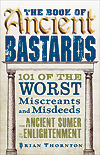
The Book of Ancient Bastards, by Brian Thornton, Adams Media, Avon, Mass., 2011, $13.95
The subtitle of Brian Thornton’s new book pretty much says it all: 101 of the Worst Miscreants and Misdeeds from Ancient Sumer to the Enlightenment. It might be worth noting, however, that the “bastards” in question, ranging from Sargon of Akkad to Henry VIII of England, are derived entirely from Western history. None of the 101 mini-biographies represent figures from East, Central or South Asia, Russia, sub-Saharan Africa or the Americas. Perhaps a more appropriate subtitle might have been “101 Ancient Bastards of the Known World.”
Having aired that minor reservation, it must be said this is one of the most entertaining little volumes to come along in some time. In his highly amusing style the author has removed the spin from history and portrayed many of its great figures as the ruthless villains they really were. His sources of information are the same ones utilized by every other notable historian through the ages: ancient chroniclers such as Herodotus, Tacitus and Plutarch.
Even limited to the Western world, Thornton’s gallery of rogues is certainly diverse, including famous figures from Mesopotamia, Egypt, Greece, Rome, Constantinople, the post-Roman Dark Ages, Medieval Europe and the Renaissance. On display are kings, pharaohs, tyrants, emperors and a not insignificant number of popes. A healthy plurality was skilled in the military arts, since those were often as necessary to their acquiring and holding power as more underhanded “politics by other means.” Quite a few of the author’s chosen historical miscreants are women. It should also be pointed out that, although not a few of the individuals described are, indeed, illegitimate, that condition is clearly not a prerequisite for inclusion. It is to be hoped the author will soon follow this darkly enlightening work with a companion volume, giving equal treatment to the ancient bastards of Russia, China, India, Mongolia, the Huns and the various Central Asian empires.
—Robert Guttman




